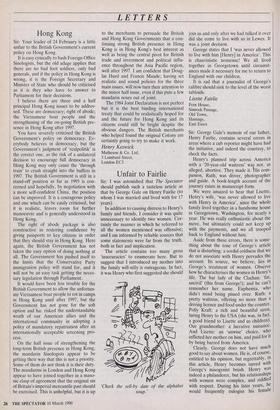LETTERS Hong Kong
Sir: Your leader of 24 February is a little unfair to the British Government's current policy on Hong Kong, It is easy cynically to bash Foreign Office Sinologists, but the old adage applies that there are no bad foot soldiers, only bad generals, and if the policy in Hong Kong is wrong, it is the Foreign Secretary and Minister of State who should he criticised as it is they who have to answer to Parliament for their decisions.
I believe there are three and a half principal Hong Kong issues to be addres- sed. These are democracy; right of abode; the Vietnamese boat people and the strengthening of the on-going British pre- sence in Hong Kong after 1997.
You have severely criticised the British Government's policy on democracy. Ev- erybody believes in democracy, but the Government's judgment of 'realpolitik' is the correct one, as the risk of a unilateral decision to encourage full democracy in Hong Kong may only cause the 'through train' to crash straight into the buffers in 1997. The British Government is still in a stand-off position as far as 1995 is con- cerned and hopefully, by negotiation with a more self-confident China, the position can be improved. It is a courageous policy and one which can be easily criticised, but it is realistic, leaves room for further manoeuvre and is generally understood in Hong Kong.
The right of abode package is also constructive in restoring confidence by giving passports to key citizens in order that they should stay in Hong Kong. Here again, the British Government has not taken the easy option of doing nothing at all. The Government has pushed itself to the limits that the Conservative Party immigration policy will stand for, and it will not be an easy task getting the neces- sary legislation through Parliament.
It would have been less trouble for the British Government to allow the unfortun- ate Vietnamese boat people to rot in camps in Hong Kong until after 1997, but the Government has not gone for the soft option and has risked the understandable wrath of our American allies and the international community in adopting a policy of mandatory repatriation after an internationally acceptable screening pro- cess.
On the half issue of strengthening the long-term British presence in Hong Kong, the mandarin Sinologists appear to be getting their way that this is not a priority. Some of them do not think it is their duty. The mandarins in London and Hong Kong appear to have joined together in a maso- nic clasp of agreement that the original sin of Britain's imperial mercantile past should be exorcised. This is unhelpful, but it is up to the merchants to persuade the British and Hong Kong Governments that a con- tinuing strong British presence in Hong Kong is in Hong Kong's best interest as well as being the central pivot for British trade and investment and political influ- ence throughout the Asia Pacific region, well after 1997. I am confident that Doug- las Hurd and Francis Maude; having set realistic and sound policies for the three main issues, will now turn their attention to the minor half issue, even if this puts a few mandarin noses out of joint.
The 1984 Joint Declaration is not perfect but it is the best binding international treaty that could be realistically hoped for and the future for Hong Kong and its citizens could still be bright despite the obvious dangers. The British merchants Who helped found the original Colony are certainly going to try to make it work.
Henry Keswick
Matheson & Co. Ltd, 3 Lombard Street, London EC3


























































 Previous page
Previous page